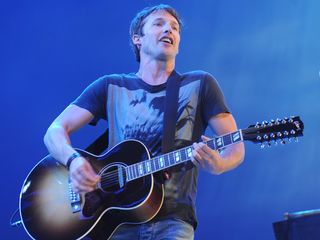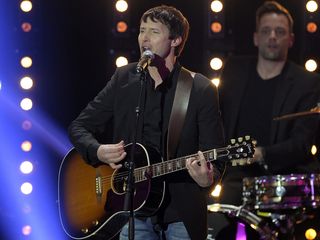
James Blunt on going back to basics, Whitney Houston and new album Moon Landing
“I really, really enjoyed making this one," gushes James Blunt, talking about his forthcoming album Moon Landing. "The best thing about it is that I made it for myself. I wasn’t even thinking about an audience. When people hear it, I think they’ll recognize it as a genuine sound and will be able to relate to it in a very personal way."
Moon Landing, due out November 5th, sees Blunt renewing his collaboration on eight cuts with Tom Rothrock, the Los Angeles-based producer who guided the singer-songwriter to multi-platinum fame with 2004's Back To Bedlam. It's a wholly naturalistic experience, largely bathed in the sounds of unvarnished folk-rock, on which Blunt, who also worked with producers Martin Terefe, Ryan Tedder and Steve Mac, achieves a startling level of intimacy, heard most notably on the elegiac ballad Miss America, written about the late superstar Whitney Houston.
Blunt sat down with MusicRadar recently to talk about the new LP, getting back to his roots and our celebrity-obsessed culture.
This is the first time you've worked with Tom Rothrock since 2007's All The Lost Souls. What do you think is special about your collaboration with him?
“Well, just that – it is a collaboration. You know, we've always stayed in touch. Tom has always been a great friend and has come off on holiday with me – a bit too much, really; he should have been off working. [Laughs] But for me, it’s been a real journey to go back to Tom. This all started when I got signed to an independent label, Custard Records, and I was an independent artist. So I worked with an independent artist, Tom, who had also worked with Elliot Smith, Badly Drawn Boy and Beck.
“We made Back To Bedlam, which, of course, had You’re Beautiful on it. That song sort of stripped me of my independent roots and took it all to a dirty place called ‘mainstream.’ That was an amazing journey and experience – three world tours. We made a second independent album, and on that I brought in my touring band. They took with them all of their great experience and musicianship, and they gave the record its sound.
“For the third record, I found that I had to try to write songs for these larger spaces I was playing, the arenas around the world. I guess I was doing what I’d always wanted to do since I was a teenager, fronting a band and playing an electric guitar, but as I said, I was writing for these big places and thinking of what an audience might want. It was phenomenal and great fun, but I think the emphasis was on the fun; it wasn’t as emotionally and personally fulfilling as when you’re writing for yourself.”
A song like Bonfire Heart has what you’re saying – a more intimate folk-rock sound.
“Yeah, absolutely. I just started stripping things back. I started realizing that I didn’t want to write for you – not ‘you’ personally, but you know what I mean [laughs] – because then I’d be writing what I thought you wanted. I’d be saying the words that I thought you wanted to hear rather than words that were simply true.
“I went initially to Martin Terefe, who actually was the guy who gave me the confidence to do what I wanted to do. By stripping things down and working with him in his studio, with him right there in the room as a producer rather than being behind a screen, we played stuff live. On a song like Blue On Blue, for example, it was played in the studio completely live, with all of the musicians performing together at once. It’s all one take. There’s no Auto-Tuning or fixing up or massaging. It’s all real. I decided that doing it this way was how I wanted to go. And it’s exciting, too – you’re not just trying for radio play.”

James Blunt on going back to basics, Whitney Houston and new album Moon Landing
You and I have talked before about how important the acoustic guitar is to you –
“That’s right, and that’s still important to me. On this album, I didn’t want to hide behind musicians or production. I stripped things down. It was important for me to get back to me with a guitar or at a piano. Doing that would let the lyrics and the vocals stand out and capture the audience. I was confident that these were some of the strongest songs I’d ever written, and going back to Tom allowed me to show them off and really realize what they were all about.
“In many ways, this is the kind of record I would have made if Back To Bedlam hadn’t sold. If I hadn’t put You’re Beautiful on it, I would have done another indie album, and it would’ve been called Moon Landing.”
I don’t want to use the word “renaissance,” but as you know, there’s a wealth of acoustic-based acts doing very well these days. Your thoughts?
“These things goes in waves, don’t they? It’s not a new thing. Before The Lumineers, there were folks playing acoustic-based music; before me there was Damian Rice, and before him there was David Gray. They didn’t invent the genre, either. It goes around in different cycles, and it will continue to do so. As long as good music comes from it, that’s all that matters.”
When you sit down to write, which guitar do you go to? You have your Gibson J-45 and your LG-1…
“Yeah, but you know what? A lot of the time it’s on piano. I played a lot more piano on this record, and you can hear that, I think. Blue On Blue is one of the most acoustic guitar-led songs on there, but it’s got some phenomenal piano, too. Postcards is one I wrote on the piano, but now it’s a ukulele song!” [Laughs]

James Blunt on going back to basics, Whitney Houston and new album Moon Landing
When you sit down at the piano to work on a song, do you go to a melodic place that’s different from when you write on a guitar?
“Well, see, I’ve always chopped and changed between the two. Obviously, I travel with a guitar because it’s just easier to check it into planes and what not. But I do like to write on both, and what happens is, if I’ve written something on one instrument I’ll play it on the other just to see if it gives me a different feel.
“I’ve always found the piano to be comfortable. You can sit at it, it’s a piece of furniture, and you can even put a computer on top of it and write down lyrics as you go. I’ll bring in the guitar to give something a bit more tempo. A song like Bonfire Heart has the tempo it does because of the guitar.”
Heart To Heart harkens back to ‘80s pop-rock – which is not a bad thing. The main guitar riff has a cool, retro feel.
“Yeah, well, I’m embarrassed to say that I’m probably an ‘80s child, aren’t I? [Laughs] I can’t escape that as a sound, which is probably why I talk about nostalgia – you can’t get away from where you come from. I like hearing the sound of the past.
“You kind of hit the nail on the head, though, because in the lyrics I say, ‘Sometimes I don’t know where I stand, you make me feel like I’m a boy and not a man.’ The whole thing is about how a girl makes you feel like a teenager again.”

James Blunt on going back to basics, Whitney Houston and new album Moon Landing
Tom isn't the only producer on Moon Landing. What do you like about working with multiple producers on one record?
“It gives me a bit of freedom. While working with Martin, I got a sense of excitement and a clear direction. Without him, this album wouldn’t have had its injection of honesty. But then I really understood what I wanted to do with Tom. He would give this album the body of work; he took me on a journey. I was singing to him rather than an imaginary audience. He took the time to allow me to go down all the wrong paths until I found the right one. I don’t know anybody else who is that patient, who would sit in a room for months on end and allow that.
“And working with Ryan Tedder on Bonfire Heart allowed me to say, ‘Let’s make this upbeat, driving song that connects with lots of people.’ That was the meaning of the song when we wrote it. He has the hyperactivity within his musicianship that I wanted.
Let’s talk about the song Miss America, which is about Whitney Houston. In many ways, this feels like your Candle In The Wind.
“I wrote it about her... and it’s weird because I never thought that I would talk about it too much. But yeah, I think it’s a very sad story. What’s worse is that it should be a great story. Her life should be a celebration. She was a phenomenal talent. She had a beautiful voice and she was an incredible-looking person. Inside and outside, there was something very special going on.
“And yet, this sadness overtook it all, and I feel that we were the ones who were spectators to it. And we’re the ones who enjoyed being spectators. We clicked online to read her story, to see her story; we bought the magazines. So we contribute in many ways, because every time you click on a link or buy a magazine, more paparazzi go out and follow those people. The same with Amy Winehouse and Princess Diana.”

James Blunt on going back to basics, Whitney Houston and new album Moon Landing
I hear what you’re saying, but at the same time, there were many of us who would click on those stories because we were rooting for those people. We wanted Amy Winehouse and Whitney Houston to get better, to seek treatment. We wanted them to be well.
“Yeah, yeah, but if you still click a link, even if you’re trying to send that person the support that you feel, the website is still sending out paparazzi to follow them. And the new lens that’s trained on that person makes their prison cell, their goldfish bowl, that much smaller and more intense. So if those people don’t have good family or good support, their personal issues will come to the fore even harder. I definitely think that we contribute to the pressures they’re under.”
When you sat down to write the song, whether it came to you in waves or all at once, did you deliberate over it? Were you like, “Should I go there?”
“It was easy to do, actually, because it’s something I feel strongly about. I had her in mind, but you know, her story is not uncommon. I could have told you that it was about somebody else and convinced you of that. Amy Winehouse’s story is the same story. I think that’s why it’s relevant. For me, it was easy to write because I think it happens often.
“Music is an amazing thing, and I can understand why people want to follow musicians. Music brings people together. I can play in Beirut, Lebanon, where Muslim, Christian and Jew will all stand in the same building and celebrate music and sing together. I can do that all across the world in different venues, and people will travel to join in. The music is one thing, but the people who play the music, we don’t have to put them on too much of a pedestal. I’m only given a stage because I’m not very tall; otherwise, you wouldn’t see me. [Laughs]
“But at the end of the day, I don’t save a life like a doctor or a nurse; I don’t educate like a teacher. I don’t rebuild a country like an aid worker, and I don’t protect people like the police or the fire department. These are the real celebrities of the world, and it’s worth it to understand that.”
Of course. At the same time, you’ve gotten the letters and e-mails – your music strikes a chord with people and helps them through tough times.
“Absolutely. And I wouldn’t take that away from it. It does do that. Perhaps the music industry confuses that aspect. What do we take away from the MV Music Awards? There’s nothing about the music – it’s all about twerking.”

Joe is a freelance journalist who has, over the past few decades, interviewed hundreds of guitarists for Guitar World, Guitar Player, MusicRadar and Classic Rock. He is also a former editor of Guitar World, contributing writer for Guitar Aficionado and VP of A&R for Island Records. He’s an enthusiastic guitarist, but he’s nowhere near the likes of the people he interviews. Surprisingly, his skills are more suited to the drums. If you need a drummer for your Beatles tribute band, look him up.

"Reggae is more freeform than the blues. But more important, reggae is for everyone": Bob Marley and the Wailers' Catch a Fire, track-by-track

“Part of a beautiful American tradition”: A music theory expert explains the country roots of Beyoncé’s Texas Hold ‘Em, and why it also owes a debt to the blues

"Reggae is more freeform than the blues. But more important, reggae is for everyone": Bob Marley and the Wailers' Catch a Fire, track-by-track

“Part of a beautiful American tradition”: A music theory expert explains the country roots of Beyoncé’s Texas Hold ‘Em, and why it also owes a debt to the blues









